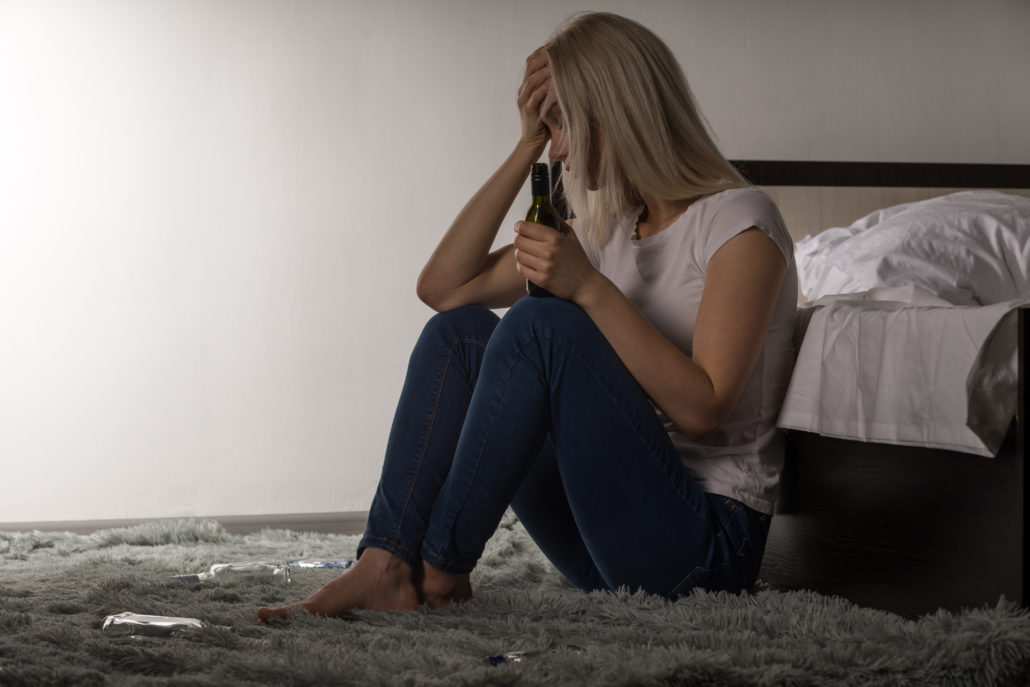What is Bipolar Disorder?
Bipolar disorder, previously known as manic depression is a severe mental illness that involves intense rage or sadness. Bipolar Disorder is characterized by periods of extreme mood swings that are related to the change in seasons. This disorder also includes days of excessive highs called mania, while some individuals experience their lowest emotional state called depression. Bipolar disorder has damaged relationships and isolated numerous Americans who do not receive specialized treatment for this condition.
Link Between Bipolar and Addiction Treatment
Bipolar disorder is a serious, chronic mental illness characterized by unusual changes in energy, mood, and activity levels. Early diagnosis and proper treatment of bipolar disorder are essential because the condition carries a high risk of suicide and can seriously impair work performance, social and family relationships, and quality of life.
Many patients use alcohol or drugs to self-medicate the symptoms of bipolar disorder. Because extreme depression can be difficult, many people who struggle with bipolar disorder get high or drink to manage symptoms. However, bipolar and addiction treatment is available, and remission and recovery are possible, especially with early intervention.
Bipolar disorder and addiction triggers and symptoms are often deeply intertwined; thus, treating one disorder without addressing the other is hugely ineffective. Instead, a rehabilitation program that provides intense treatment for both disorders at the same time is advised. Bipolar and addiction treatment is essential when conditions are present. Bipolar disorder involves enduring two conflicting emotional states: mania and depression, from which the disorder got its former name of manic-depressive disorder. During manic episodes, an individual feel energetic, excited, self-confident, and euphoric, and often have a diminished need for sleep. During depressive episodes, the person feels listless, hopeless, and sad.

Bipolar Disorder is Complex Illness
Bipolar disorder is more complex than a simple division between mania and depression. Many people with bipolar disorder go through periods when their mood is balanced or euthymic (for instance, not manic, euphoric, or depressed), even without medication. Some people experience a “mixed state” that blends the features of depression and mania at the same time. Mania does not always involve feeling good. Some people feel irritable instead, especially when substance use and addiction are involved. Moreover, manic episodes can differ in severity. DSM-5 divides manic episodes into two types:
- Mania: This lasts for a week and causing notable impairment in occupational and social functioning or requiring hospitalization.
- Hypomania: This lasts for four days, often with less severity (for instance, the change may be obvious but may not impair functioning)—some people with bipolar disorder experience psychotic features, such as delusions and hallucinations.
Bipolar And Addiction Treatment Statistics
- Bipolar I and II disorders are common and serious mental illnesses that have been reported to occur in approximately 1–3% and 3–5% of the US population, respectively. Bipolar disorders are often complicated by co-occurring substance use disorders (SUDs). Multiple comorbidities accompany bipolar disorder, but substance abuse is particularly common, and its co-occurrence often leads to a more damaging and difficult to treat. This is according to the National Center for Biotechnology Information (NCBI)[ [1].
- Research shows that from 30 percent to more than 50 percent of individuals with bipolar disorder (bipolar I or bipolar II) will develop a substance use disorder (SUD) sometime during their lives. This co-occurrence complicates the course, diagnosis, and treatment of SUDs. Alcohol and cannabis are the substances most often abused, followed by cocaine and then opioids. This is according to the Substance Abuse and Mental Health Service Administration (SAMHSA) [ [2].
- Research has consistently shown that co-occurring addictions are associated with negative effects on illness results, including more frequent and prolonged episodes, decreased compliance with treatment, lower quality of life, and increased suicidal behavior. Recent research on the causal relationship between bipolar and addiction suggests that a subgroup of bipolar patients may develop a relatively milder form of affective illness that is expressed only after extended exposure to alcohol or drug abuse. This is according to the National Center for Biotechnology Information (NCBI) [3].

With a combination of research-based therapeutic methods, pharmaceutical interventions, and psychosocial services, the outcomes of bipolar and addiction treatment can improve significantly.
5 Types Of Bipolar Disorder
Bipolar I
People with bipolar I tend to undergo manic or mixed episodes lasting at least seven days and depression lasting at least two weeks. Manic episodes may be so intense that the person requires immediate medical attention.
Bipolar II
People with bipolar II experience depression and less severe manic or mixed episodes than people with bipolar I.
Bipolar Disorder Not Otherwise Specified
Doctors diagnose people with BP-NOS when a person’s symptoms are unmistakably abnormal, but they do not meet the criteria for bipolar I or bipolar II.
Cyclothymic
Also known as cyclothymia, cyclothymic disorder is defined by mild episodes of depression and mania occurring for at least two years. Doctors diagnose it when symptoms do not meet the criteria for bipolar I or II.
Rapid-Cycling Bipolar
A person with rapid-cycling bipolar disorder suffers four or more episodes of depression, mania, or mixed episodes in one year.
Bipolar Disorder Symptoms And Addiction Signs
Because bipolar disorder has a wide range of symptoms, it can be confused for other disorders. This can make screening and diagnosis hard. Clients who screen positive for bipolar disorder—or, in fact, any mental disorder—will need to be referred for an assessment by a behavioral health professional licensed to diagnose and treat mental disorders. The same is true for clients who are not formally screened but who appear to have mental disorders.
Both bipolar disorder and addiction sometimes present similar symptoms, making it almost indistinguishable for someone inexperienced to identify which is which. As hard as these are to identify, it’s crucial to know how to recognize the warning signs, which serve as an indication of bipolar and addiction. The signs to look out for include:
- People can’t remember the last time they felt fully satisfied with life without the presence of alcohol or drugs
- People use alcohol or drugs in the hopes of overcoming feelings of fear, stress, and anxiety
- There’s internal anxiety that can only be relieved by certain rituals and behaviors
- Individuals have trouble holding down a job or meeting work or academic responsibilities
- Taking drugs and alcohol as coping mechanisms
- Dramatic changes in mood or energy levels
- Severe worry or tension
- Failure to concentrate
- Difficulty maintaining relationships, because of mood swings or behaviors
- The withdraw from family, friends, and those who offer support
- Prolonged or intense feelings of despair, hopelessness and worthlessness
- Changes in sleep patterns such as, excessive sleep or insomnia
- Weight or appetite change
- Suicidal tendency
Impact of Bipolar and Addiction
Bipolar disorder symptoms can vary from one individual to another. For example, alcohol and drug addiction may occur in either a depressive or depressive state. When individuals are in a manic phase, they may use stimulants like meth or cocaine to lengthen this high-energy period or depressants like tranquilizers or alcohol to calm down. In a depressive phase, depressants or sedatives may be used to calm feelings of hopelessness, while stimulants may be used to elevate mood.
Taking drugs or alcohol when a person suffers from bipolar disorder upsets the mind’s chemical imbalance even further. When an individual has bipolar disorder, the body suffers from highly abnormal and varying levels of serotonin and dopamine. These chemicals are responsible for creating negative and positive emotions.

Dual Diagnosis Bipolar And Addiction Treatment
Treating co-occurring disorders involves tackling both problems at once. Doctors use medications and therapy to treat these conditions. For example, people suffering from both conditions can get bipolar and addiction treatment through an inpatient program using a dual diagnosis approach.
The exact definition of dual diagnosis (also referred to as co-occurring disorders) can differ between institutions. However, it is generally defined as the specific treatment of someone who has been diagnosed with having a substance abuse disorder and a mental health disorder at the same time. There is no distinction of whether the mental condition led to substance abuse or vice versa. Addiction treatment professionals understand that mental health and substance abuse have a complex relationship that is difficult to extricate from one another.
While there is no single best bipolar and addiction treatment, research has shown that successful dual-diagnosis treatment uses an integrated approach. Standard therapeutic approaches include cognitive-behavioral therapy (CBT), cognitive processing therapy (CPT), and prolonged exposure therapy (PET).
Medically-Assisted Treatment as part of the Dual Diagnosis Program for bipolar and addiction treatment can help a person suffering from both conditions. Addiction treatment medications extinguish cravings and ease withdrawal symptoms. The type of addiction medication prescribed depends on the persons’ drug of abuse. Medications for bipolar disorder can calm mood shifts and bring balance to a person’s life.
Find The Right Bipolar Primary Mental Health Treatment along with secondary substance abuse therapy
If you or someone you love is struggling with primary bipolar disorder and secondary substance abuse disorder, get help. Begin with a free assessment to find out the proper bipolar and addiction treatment for your situation. We Level Up Florida offers a professional team trained to provide primary mental health plus co-occurring Bipolar and Addiction Treatment. Contact our team at We Level Up Florida today to learn more about suitable treatment options!